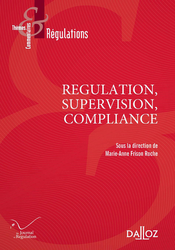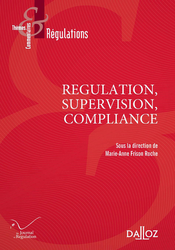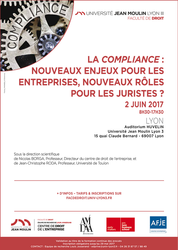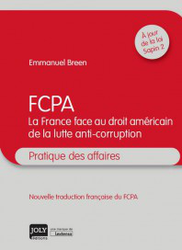Nov. 1, 2017
Thesaurus : Doctrine
Référence complète : Kévorkian, A., Les programmes de conformité aux règles de concurrence : La fin des réductions d'amendes ?, Cahiers de droit de l'entreprise n° 6, novembre 2017, éditorial 6.
Les étudiants de Sciences Po peuvent consulter l'article via le drive, dossier "MAFR - Régulation & Compliance"
Oct. 5, 2017
Thesaurus : Doctrine
Full reference : Augagneur, L.-M., La compliance a-t-elle une valeur ?, JCP E, n° 40, 5 octobre 2017, p. 1522.
Sciences Po students can read the article via the drive, folder "MAFR-Régulation & Compliance".
Oct. 4, 2017
Thesaurus : Doctrine
Référence complète : Donnedieu de Vabres, L., Pas de compliance sans confiance, in Frison-Roche, M.-A. (dir.), Régulation, Supervision, Compliance, Série Régulations, Dalloz, 2017.
Lire la présentation générale de l'ouvrage dans lequel l'article est publié.
Consulter les autres ouvrages de la Série dans laquelle l'ouvrage est publié.
Les étudiants de Sciences-Po peuvent consulter l'article via le Drive, dossier "MAFR-Régulation"
Oct. 4, 2017
Thesaurus : Doctrine
► Référence complète : J.-M. Darrois, "La loi Sapin 2 : un défi pour les avocats", in M.-A. Frison-Roche (dir.), Régulation, Supervision, Compliance, Dalloz, Série Régulations, 2017, p.91-94.
____
📕Lire la présentation générale de l'ouvrage dans lequel l'article est publié.
____
📚Consulter les autres ouvrages de la Série dans laquelle l'ouvrage est publié.
____
Les étudiants suivant le cours de Marie-Anne Frison-Roche peuvent lire l'article en texte intégral.
________
Oct. 4, 2017
Thesaurus : Doctrine

Référence complète : La Cotardière, Arnaud de, Le rôle de l'avocat en matière de compliance, in Frison-Roche, M.-A. (dir.), Régulation, Supervision, Compliance, Série Régulations, Dalloz, 2017.
Lire la présentation générale de l'ouvrage dans lequel l'article est publié.
Consulter les autres ouvrages de la Série dans laquelle l'ouvrage est publié.
Les étudiants de Sciences-Po peuvent consulter l'article via le Drive, dossier "MAFR-Régulation"
Oct. 4, 2017
Thesaurus : Doctrine

► Full Reference: B. de Juvigny, "La compliance, bras armé de la régulation financière" ("Compliance, the arm of financial regulation"), in M.-A. Frison-Roche (ed.), Régulation, Supervision, Compliance, Dalloz, coll. "Thèmes & Commentaires", "Régulations" Serie, 2017, pp. 17-28
____
📕read a general presentation of the book, Régulation, Supervision, Compliance, in which this article is published
____
► English summary of the article (done by the Journal of Regulation & Compliance - JoRC):
____
🦉This article is available in full text to those registered for Professor Marie-Anne Frison-Roche's courses
________
Oct. 4, 2017
Editorial responsibilities : Direction of the collection "Regulations & Compliance", JoRC & Dalloz

🌐follow Marie-Anne Frison-Roche on LinkedIn
🌐subscribe to the Newsletter MAFR Regulation, Compliance, Law
____
► Full Reference: M.-A. Frison-Roche (ed.), Régulation, Supervision, Compliance (Regulation, Supervision, Compliance), Dalloz, coll. "Thèmes & Commentaires", "Régulations" Serie, 2017, 148 p.
____
► General presentation of the book: Regulation. Supervision. Compliance. Three terms that until recently were virtually unknown in legal systems. Or at least considered to be peculiar to Anglo-American legal systems: Regulation, Supervision, Compliance. These terms are like Trojan horses through which Common Law is taking over our legal traditions to make European companies, especially banks, bend over backwards, take over institutions and impose methods.
Three words by which the invasion is carried out. Through the violence of repression and compliance penalties, through the mildness of codes of conduct and corporate social responsibility. By laws as new as they are strange, such as the French so-called "Sapin 2" law or the French law introducing a "duty of vigilance" for companies whose fault would be to have succeeded in expanding internationally.
One can have this defensive conception of Compliance, generating a "Compliance Law", produced by the internalisation of Regulatory Law in global economic operators, who are then subject to supervision by Regulators, even though these firms are not regulated, with Compliance extending beyond the supervised sectors (banks and insurance companies).
We can (and maybe must) have a more welcoming, and therefore more offensive, conception of Compliance. It can be the crucible of a relationship of trust on a supra-national scale between these operators and the regulators, the former being able to contribute, like the latter, to serving goals that go beyond them all, of which the fight against corruption and money laundering are but a few examples.
In this way, the issue is the construction of the European Compliance Law.
____
📝read the interview given by Marie-Anne Frison-Roche to the Petites Affiches, "We need to build a European compliance system - that's the future! ire l'entretien donné par Marie-Anne Frison-Roche aux Petites Affiches ,"Il faut construire un dispositif européen de compliance, voilà l'avenir !" ("We need to build a European Compliance System - that's the Future!"), about the publication of this book (in French)
____
____
This volume is the continuation of the books dedicated to Compliance in this collection.
📚Read the presentations of the other books on Compliance in this Serie:
- further books:
🕴️M.A. Frison-Roche (ed.), 📕Le système probatoire de la Compliance, 2025
🕴️M.A. Frison-Roche (ed.), 📕Compliance et Contrat, 2024
🕴️M.A. Frison-Roche (ed.), 📕L'obligation de Compliance, 2024
🕴️M.A. Frison-Roche et M. Boissavy (eds.), 📕Compliance et droits de la défense. Enquête interne - CJIP - CRPC, 2024
🕴️M.A. Frison-Roche (ed.), 📕La juridictionnalisation de la Compliance, 2023
🕴️M.A. Frison-Roche (ed.), 📕Les Buts Monumentaux de la Compliance, 2022
🕴️M.A. Frison-Roche (ed.), 📕Les outils de la Compliance, 2021
🕴️M.A. Frison-Roche (ed.), 📕Pour une Europe de la Compliance, 2019
🕴️N. Borga, 🕴️J.-Cl. Marin and 🕴️J-.Ch. Roda (eds.), 📕Compliance : l'Entreprise, le Régulateur et le Juge, 2018
- previous books:
🕴️M.A. Frison-Roche (ed.), 📕Internet, espace d'interrégulation, 2016
📚Read the presentations of the other titles of the Serie.
____
🏗️General construction of the book:
Consulter le sommaire de l'ouvrage.
____
► Understand the book through the Table of Contents and the summaries of each article:
🕴️M.-A. Frison-Roche, 📝Du droit de la régulation au droit de la compliance
I. AUTOUR DE LA NOTION DE COMPLIANCE (AROUND THE NOTION OF COMPLIANCE)
🕴️B. de Juvigny, 📝La compliance, bras armé de la régulation
🕴️I. Falque-Pierrotin, 📝L'Europe des données ou l'individu au coeur d'un système de compliance
🕴️B. Lasserre, 📝Concurrence et bien public
🕴️J.-M. Sauvé, 📝Compliance, droit public et juge administratif
🕴️J.-Cl. Marin, 📝Droit pénal et compliance
II. CHOCS ET ACCLIMATATION DE LA COMPLIANCE DANS LE SYSTÈME JURIDIQUE (SHOCKS AND ACCLIMATISATION OF COMPLIANCE IN THE LEGAL SYSTEM)
🕴️D. Migaud, 📝Le nouveau rapport entre l'État et les normes impliquées dans la compliance
🕴️A. C. Bénichou, 📝Nouvelles technologies : réflexions sur la compliance et l'éthique
🕴️J.-M. Darrois, 📝La loi Sapin II : un défi pour les avocats
🕴️Y. Perrier, 📝"Diplomatie" de la compliance et de sa régulation
III. LES DIALOGUES OUVERTS PAR LA COMPLIANCE (DIALOGUES OPENED UP BY COMPLIANCE)
🕴️J.-B. Auby, 📝Le dialogue de la norme étatique et de la compliance
🕴️L. Donnedieu De Vabres, 📝Pas de compliance sans confiance
🕴️J. Bédier, 📝La compliance, un outil actif de développement de l'entreprise
🕴️A. De La Cotardière, 📝Le rôle de l'avocat en matière de compliance
________
Oct. 4, 2017
Thesaurus : Doctrine
Référence complète : Migaud, D., Le nouveau rapport entre l’État et les normes impliquées dans la compliance, in Frison-Roche, M.-A. (dir.), Régulation, Supervision, Compliance, Série Régulations, Dalloz, 2017.
Lire la présentation générale de l'ouvrage dans lequel l'article est publié.
Consulter les autres ouvrages de la Série dans laquelle l'ouvrage est publié.
Les étudiants de Sciences-Po peuvent consulter l'article via le Drive, dossier "MAFR-Régulation"
Oct. 4, 2017
Thesaurus : Doctrine
Référence complète : Falque-Pierrotin, I., L'Europe des données ou l'individu au coeur d'un système de compliance, in Frison-Roche, M.-A. (dir.), Régulation, Supervision, Compliance, Série Régulations, Dalloz, 2017.
Lire la présentation générale de l'ouvrage dans lequel l'article est publié.
Consulter les autres ouvrages de la Série dans laquelle l'ouvrage dans l'article a été inséré est publié.
Les étudiants de Sciences-Po peuvent consulter l'article via le Drive, dossier "MAFR-Régulation"
Oct. 4, 2017
Thesaurus : Doctrine
Référence complète : Bédier, J., La compliance, un outil actif de développement de l'entreprise, in Frison-Roche, M.-A. (dir.), Régulation, Supervision, Compliance, Série Régulations, Dalloz, 2017.
Lire la présentation générale de l'ouvrage dans lequel l'article est publié.
Consulter les autres ouvrages de la Série dans laquelle l'ouvrage est publié.
Les étudiants de Sciences-Po peuvent consulter l'article via le Drive, dossier "MAFR-Régulation"
Oct. 4, 2017
Thesaurus : Doctrine
Full reference : Auby, J.-B., Le dialogue de la norme étatique et de la compliance, in Frison-Roche, M.-A. (dir.), Régulation, Supervision, Compliance, Série Régulations, Dalloz, 2017.
Read the General presentation of the book in which the article is published.
Read the other books of the sérieux in which the book is published
Sciences Po Students can read the article via the Drive, folder "MAFR-Régulation"
Oct. 4, 2017
Thesaurus : Doctrine
Référence complète : Perrier, Y., Une "diplomatie" de la Compliance et de sa régulation, in Frison-Roche, M.-A. (dir.), Régulation, Supervision, Compliance, Série Régulations, Dalloz, 2017.
Lire la présentation générale de l'ouvrage dans lequel l'article est publié.
Consulter les autres ouvrages de la Série dans laquelle l'ouvrage est publié.
Les étudiants de Sciences-Po peuvent consulter l'article via le Drive, dossier "MAFR-Régulation"
Oct. 4, 2017
Thesaurus : Doctrine
Référence complète : Marin, J.-C., Droit pénal et compliance, in Frison-Roche, M.-A. (dir.), Régulation, Supervision, Compliance, Série Régulations, Journal of Regulation & Compliance et Dalloz, 2017, p.65-72.
____
📝 Lire la présentation générale de l'ouvrage 📕Régulation, Supervision, Compliance dans lequel l'article est publié.
Consulter les autres ouvrages de la collection dans laquelle l'ouvrage est publié.
Oct. 4, 2017
Thesaurus : Doctrine
Référence complète : Lasserre, B., Concurrence et bien public à travers la compliance, in Frison-Roche, M.-A. (dir.), Régulation, Supervision, Compliance, Série Régulations, Dalloz, 2017.
Lire la présentation générale de l'ouvrage dans lequel l'article est publié.
Consulter les autres ouvrages de la Série dans laquelle l'ouvrage est publié.
Les étudiants de Sciences-Po peuvent consulter l'article via le Drive, dossier "MAFR-Régulation"
Oct. 4, 2017
Thesaurus : Doctrine
Référence complète : Bénichou, A., Nouvelles technologies : réflexions sur la Compliance et l’Éthique , in Frison-Roche, M.-A. (dir.), Régulation, Supervision, Compliance, Série Régulations, Dalloz, 2017.
Lire la présentation générale de l'ouvrage dans lequel l'article est publié.
Consulter les autres ouvrages de la Série dans laquelle l'ouvrage est publié.
Les étudiants de Sciences-Po peuvent consulter l'article via le Drive, dossier "MAFR-Régulation"
Sept. 7, 2017
Thesaurus : Soft Law
Sept. 5, 2017
Thesaurus : Doctrine
Référence complète : Boucobza, X. et Serinet, Y.-M., Loi "Sapin 2" et devoir de vigilance : l'entreprise face aux nouveaux défis de la compliance, D.2017, p.1619 et s.
Les étudiants de Sciences po peuvent via le Drive lire l'article dans le dossier "MAFR - Régulation".
July 6, 2017
Conferences

Référence générale : Frison-Roche, M.-A., D'où vient la compliance ? ; Où va la compliance : la nécessité de construire un véritable Droit de la compliance, in Cour de cassation et École Nationale de la Magistrature, La compliance, la place du droit, la place du magistrat, Grand'chambre de la Cour de cassation, 6 juillet 2017.
Lire l'intégralité du programme.
Accéder au programme sur le site de la Cour de cassation. , permettant l'inscription au colloque.
Un ouvrage à venir prendra appui sur les travaux de ce colloque.
_____
D'où vient la Compliance ?
Lorsqu'on lit les différents travaux afférents à la Compliance, l'on a parfois une impression étrange : si l'on a du mal à comprendre les mécanismes de Compliance, si l'on en vient à dire que l'on ne peut le comprendre qu'au cas par cas, cela tient au fait que la Compliance change d'aspect suivant qu'on est à une époque ou à une autre, dans un continent ou dans un autre, dans une branche du droit ou dans une autre, dans une entreprise ou dans une autre.
A chaque fois, l'on a l'impression de respirer un air différent, de la violence la plus forte exprimée par les États-Unis, comme le fait le FTCA pour la corruption ; mais l'on parlera encore de compliance lorsqu'une entreprise décide d'édicter une charte éthique au nom de sa capacité autorégulatrice. Et l'on ne comprend pas comment est-ce que cela pourrait constituer un ensemble cohérent, si les différentes personnes ne parlent pas la même langue. Cette impression de cacophonie ne semble que s'accroître, chacun semblant se "spécialiser" dans une des voies, sans qu'aucune harmonie ne se dégage.
Si l'on reprend d'une façon plus historique l'évolution, il apparaît que les mécanismes de Compliance ont 4 origines. Quatre origines qui n'ont pas de rapport les unes avec les autres. Qui ont produit chacune des effets techniques propres, qui perdurent et se superposent. Comment effectivement ne pas en être abasourdi ? Après cette première impression, il faut "dénouer les fils", reconstituer les 4 corpus à la fois cohérents, fondés qui se rattachent d'une façon autonome à chacune des 4 origines.
En effet, la première origine est celle des crises financières américaines, dont la naissance est logée dans la première partie du 20ième siècle dans le dysfonctionnement interne des opérateurs systémiques bancaires qui tiennent les marchés financiers, ce qui a entraîné le pays dans la crise générale. Cela a produit un premier corpus.
La deuxième origine tient en Europe après la seconde guerre mondiale dans l'idée que le Droit doit régner et que toute entreprise doit, à propos de toute règle de Droit, donner à voir en Ex Ante qu'elle le respecte. Cette passion du Droit fait passer l'Ex post du Droit (sanction des violations) en Ex Ante (manifestation du respect), certaines entreprises pouvant y avoir intérêt pour montrer leur amour du Droit et de la Vertu. Cela a produit un deuxième corpus, notamment en Droit de la concurrence.
La troisième origine intervient dans les années 1990 dans le constat fait par les États de leur propre faiblesse et de la puissance d'entreprises globales, en internalisant en leur sein des "buts monumentaux", ce mouvement étant la réponse des autorités publiques au phénomène de mondialisation. Cela ne concerne que les entreprises globales.
La quatrième origine est dans la volonté exprimée par un entreprise, qui peut être concernée par les trois premiers mouvements mais ne l'être pas, de se soucier d'autre chose que la réalisation de profit, cette prise en charge d'autrui, même lointain, faisant se rejoindre la Compliance et la Responsabilité sociale des entreprises.
Consulter les slides servant de base à l'intervention.
_____
Où va la Compliance ?
s

June 30, 2017
Publications

This working paper is the support for the article to appear in the collective book dedicated to our very dear friend and colleague Philippe Néau-Leduc.
It uses the Bilingual Dictionary of the Regulatory and Compliance Law.
Compliance Law has the same teleological functioning as the Economic Law to which it belongs, which consists in placing the normativity of rules, decisions and reasoning in the aims pursued. Once we know what the goals of compliance techniques are, then we know who should be responsible for them, who must be subject to them, who must activate the rules: compliance rules must be activated by those who are in the best position to achieve the outcome in order to achieve the goal sought by the authority which designed the compliance mechanism. The "circles" are thus plotted in a rational and pragmatic way. That, all of it ("useful effect"), but not beyond that. The notion of efficiency does not always imply balancing: on the contrary, it can involve drawing circles which designate those who are "placed" to carry the burden of the rules because they are capable of producing them the desired effects. Within these circles, the rules must apply without restriction and without compromise, but they must not apply beyond these circles.
Drawing such circles requires defining the Law of Compliance itself, since on the one hand the choice of those who must implement the Compliance depends on the aims of the Compliance and on the other hand the definition of the Law of Compliance is itself teleological in nature. This is why, contrary to the assertion that the exercise of definition would be useless in these matters, which would be above all on a case-by-case basis, this effort to define and determine the purposes is, on the contrary, necessary in practice to show which enterprise must bear the obligations of compliance and which must not.
But it is enough to have posed this to reveal the major difficulty of the Compliance, that explains resistances, and even gives the impression that one is confronted with an aporia. If, as a matter of principle, what is expected of the "users" of the Compliance mechanisms must be articulated to the aim that is affected by the authors of the compliance mechanisms to them, we must have a minimum correspondence between the aims of these authors (Legislators and Regulators) and the aims pursued by those who are responsible for implementing them: companies. However, this correspondence does not exist at first sight, because the compliance mechanisms are found to be uniquely based on "monumental goals" which the public authorities have a legitimate concern, whereas companies have for their own interest . The two circles do not match. The internationalization of concern for these aims in companies would therefore be only a mechanism of violence of which enterprises are the object, violence felt as such. (I).
To resolve this violence, it is better to stop confusing the State and enterprises, whose goals are not the same, and draw the circle of subjects of law "eligible" for Compliance. It is highly legitimate to target certain entities, in particular this category of companies, which are the "crucial operators", in a binding way, as it is legitimate to govern companies that have expressed a desire to surpass their own interests. These circles of a different nature can overlap on a concrete operator: for example, if a bank - alway a crucial operator that is structural because it is systemic - is also international - a crucial operator because of its activity - decides to worry about others by commitments verified by the authorities to overcome their own interest (social responsibility), but these different circles are not confused. In any case, companies may belong to only one circle, or even belong to none. In the latter case, they must therefore remain beyond the reach of the pressure and cost of Compliance Law, in particular because they are not objectively required to realize the "monumental goals" aimed at effectiveness and do not want it: in a liberal system, it is for the public authorities to aim at the general interest, the ordinary people indirectly participating in it by paying the tax. (II).
It is by making these "Compliance Circles" of eligible subjects of this specific Law to implement the heavy but justified and controlled burden of Compliance with regard to the monumental goals that this new system aims, that then opens a royal way in order to find a uniqueness and to increase the "monumental function" of the Compliance Law by a relation of Trust towards the global general interest, rather than the mechanical application of rules whose meaning is not understood and whose perception is no longer perceived than violence.
June 2, 2017
Conferences

Reférence complète : Frison-Roche, M.-A., Les fonctions de la Compliance. Un choix politique à faire ("The functions of Compliance. A political choice to do"), in Borga, N. et Roda, J.-Ch. (dir.), La compliance : nouveaux enjeux pour les entreprises, nouveaux rôles pour les juristes ? ("Compliance: new challenges for companies, new roles for lawyers?"), Centre du Droit de l'entreprise Louis Josserand, Université Lyon IIII Jean Moulin, France, Lyon, 2 juin 2017.
Summary of the conference :
Compliance mechanisms are being constituted in "Compliance Law", new branch of Economic Law. Its functions are determined by the goals. But the goals are "monumental", since it is nothing less than the end of corruption, trading in influence, arms trafficking, international terrorism, trafficking in human beings, selling of human organs, the effective safeguard of environmental protection, safeguarding the planet, access to culture for all, preservation of civilization, the effectiveness of human rights ...
The goals of a company are not a priori of this order, even if every firm understands that it is clever to appear amiable.
By comparing the two types of goals, a difference of nature is measured.
By the Compliance Law, companies are therefore invited to "get out of themselves.
Consequently, the functions that shape the contours of Compliance Law transform those who are the "subjects of law", the enterprises: these are the subjects, insofar as they are agents of legality. But this can not be the case for all companies.
If the effect of Compliance were to be generalized to all companies, this would be catastrophic and would make no sense.
However, who firmly and precisely drew the circle of "legal subjects eligible to be the legality agent" of Compliance? With the considerable costs and responsibilities that go with it?
If it has not been the Legislator, it will have to be the Judge. Because the judge is guardian of the spirit of Law and guardian of legal orders. Especially if it is a global legal order.
___
Moreover, companies are not only passive subjects of Compliance Law - which would be the case of a misunderstood Compliance Law - but are also active subjects of Compliance Law. Indeed, these "monumental goals" which draw the functions of the Compliance are exactly the same as those of the Corporate Social Responsibility.
Thus, if the Compliance is conceived of only as an immense and empty submission of all undertakings to total regulation, the result will be an opposition between the regulatory power and the will of undertakings, a concrete opposition between public authorities and companies. If, on the other hand, we conceive Compliance Law as that by which "crucial enterprises" like the Regulators are moving towards the realization of "monumental goals, then Compliance Law crystallizes a" Trust Pact""between the two, Which goes beyond the borders and becomes a means of regulating globalization.
This second conception is the future of European Law.
____
See the slides (in French).
Read the working paper on which the conference is based (working paper in English)
May 11, 2017
Conferences

Reference : Frison-Roche, M.-A., Le contrat est-il l'instrument optimal de la RSE ? ("Is the Contract the optimal instrument of CSR?") in Trébulle, F.-G. (modérateur), Les instruments de la RSE : le contrat (The instruments of CSR"), cycle of conferences organized by the Cour de cassation (French Civil Supreme Court and the Universities of Paris-Dauphine, Paris VIII and Paris I),Cour de cassation, Paris, 11 mai 2017.
Read the slides (in French) as served as the basis of the conference les slides
Read the program on the Cour de cassation wesite (in French).
Read the program of the whole cycle of conferences in which this conference enters (in French)
Corporate Social Responsibility belongs to Economic Law. It thus enters into its logic of efficiency, leading to apprehend any legal mechanism as an instrument, the contract as the others. This does not mean that everything is only an instrument, on the contrary. Economic Law, when it takes the form of Regulation Law, places the principles in the aims pursued. It is in these principles that it can meet CSR if the goals are the same.
In view of these aims, everything is an instrument. On the scale of goals which are "monumental"
New laws, such as in France in 2016 the Sapin 2 law or in 2017 the law establishing a "duty of vigilance" with uncertain contours, may use the contract only as a vehicle for legal obligations to be performed by the company
But the contract can also be chosen as an instrument by the company in that it pursues the same goals of general interest, becoming global
In this, the contract converges towards what is being constructed: a Compliance Law.
On this notion of "Monumental Goal", see Frison-Roche, M-A., Compliance Law, 2016 ; From Regulation Law to Compliance Law, 2017.
For a whole demonstration, see Frison-Roche, M.-A.,From Regulation Law to Compliance Law, 2017.
On this notion of "global general interest", and maybe of "global public service", see Frison-Roche, M.A., From Regulation Law to Compliance Law, 2017 .

March 30, 2017
Publications

Compliance. Trust. Two words that come more and more often than before at our readers' eyes or listeners' ears. And yet they do not seem to match well. They even seem to repel each other.
Indeed, Compliance is the way in which Public Authorities trust certain private operators, not in themselves, but with their structural capacities to mechanically capture the information that these authorities need (I).
This presupposes a vision of the world in which Companies are powerful and powerful alone but are not virtuous, while Public Authorities, such as the Public Prosecutor's Office or Regulators, are weak but virtuous alone. Such a conception of Compliance transforms companies into automata. Such a vision of the world has no future: only human beings can be trusted, whose fallibility must be accepted, as Compliance is then the expression of a relationship built on trust that is to be seen between non-mechanical operators, namely public Institutions and private Operators, who can both have in common concern for an interest which goes beyond them and which was formerly called the general interest (II).
From this reality, no new doubt for private companies, but which explains the strange intimacy between the violent Compliance Law and the new spontaneous order of Corporate Social Responsibility, it is up to them to demonstrate this concern Cf others that it shares with the Public Authorities, except to fall in Compliance reduced to costly procedures, empty endless staked out of sanctions without control.
It is thus for Companies to make this branch of Compliance Law emerging become what can be the best, when it is possible that it becomes what would be the worst.
March 29, 2017
Thesaurus : Doctrine

Référence complète : Breen, E., FCPA. La France face au droit américain de la lutte anti-corruption, coll. "Pratique des affaires", Joly éditions, 2017, 256 p.
March 7, 2017
Thesaurus : Doctrine
Référence complète : Chaltier, F., A la recherche d'un statut pour les lanceurs d'alerte, Petites Affiches, 9 mars 2017, p.4-15.
Les étudiants de Sciences po peuvent lire via le drive l'article dans le dossier "MAFR - Régulation"
Feb. 2, 2017
Conferences

Référence : Frison-Roche, M.-A., Le droit de la
Le Droit de la
En effet, les autorités publiques expriment des buts monumentaux dépassant le fonctionnement marchand et qu’elles n’ont pas les moyens de mettre en œuvre mais dont elles chargent certaines entreprises de la concrétisation. Ainsi, la
Face à ce phénomène américain, les entreprises européennes sont restées passives, se contentant d’être condamnées. Il convient bien plutôt de s’approprier ce Droit de la
Enedis est à ce titre un sujet dynamique de
